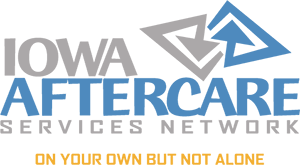faqs
Sometimes the details do matter. From eligibility criteria to the specific services provided, we are here to help youth figure out if Aftercare is right for them.
Below, you’ll find everything from eligibility criteria to details about specific Aftercare services. Our ultimate goal is to help you figure out how Aftercare can support you and help you achieve success. We’re sharing some of the most commonly asked questions about Aftercare, but don’t hesitate to contact us if you want more information.
Aftercare participants meet at least twice monthly with an IASN Self-Sufficiency Advocate (SSA). Your Advocate will help you set goals, develop important life skills, connect you with community resources, and strengthen personal relationships. Aftercare is voluntary. As long as you are eligible, it is your choice to receive Aftercare assistance or not. To learn more contact an Aftercare Advocate in your Iowa county.
Core Aftercare is for young adults between the ages of 18 and 21 who left foster care, State Training School (STS) or court-ordered detention at age 18 or older, or between the ages of 17½ and 18 and had been in placement for at least six months at the time you left placement. You may also be eligible if you were adopted or placed in subsidized guardianship on or after the age of 16. Extended Aftercare is for those ages 21 and 22 (same requirements). You must live in Iowa to receive Aftercare services. Visit IASN Services to learn more.
The program is voluntary, but to remain enrolled you have to work toward self-sufficiency. You will have regular meetings with your SSA (minimum of twice a month) so they can help you reach your goals. This may include finding and keeping a job, continuing your education, or completing job training. See IASN Fact Sheet for more information.
Financial support is available to Aftercare participants who qualify for the Preparation for Adult Living (PAL) stipend. To qualify for PAL, you must have exited foster care or other court-ordered placement at age 18 or older and be enrolled in post-secondary education or a work training program, and/or be employed. If you are currently between the ages of 18 - 21 years old and think you might be eligible, contact the Aftercare agency in your county, your former DHS caseworker, or a Transitional Planning Specialist (TPS) to sign an eligibility determination form. You can also call 800-447-1985 for referral to an agency.
If you are not eligible for the PAL stipend, we may be able to help you meet emergency or critical expenses in other ways.
If you currently live in Iowa and meet the eligibility criteria of being a former foster care recipient that aged out of care, you can receive Aftercare services. It does not matter if you were in foster care in another state or not a resident of Iowa while in care. However, you would not be eligible for Preparation for Adult Living (PAL), a monthly financial stipend.
If you move, but continue to live in the state of Iowa, Aftercare can still work with you. Aftercare has agencies and Self-Sufficiency Advocates (SSA's) that serve all 99 counties in Iowa. Just inform your SSA that you would like to continue receiving Aftercare services and the SSA will help you connect to another Aftercare provider in your new county. You can also check our Agency by County directory to locate your new provider.
No, Aftercare does not provide housing. However, Advocates will work with you to find safe housing and connect you with housing resources and financial assistance.
The Education Training Voucher (ETV) is available to former foster youth. You can find information on the ETV program at the Iowa College Aid Commission. You do not have to participate in Aftercare to qualify for this education grant. However, Aftercare services can help you fill out financial assistance applications, scholarship forms and connect to colleges and training programs that offer grants and other assistance. You may also utilize part or all of the Aftercare financial assistance in your pursuit of education goals.
The program has services that will and have helped me since I graduated from high school. I am forever grateful for the help that I will and have received. I would not be where I am today without this program.
Grace, aged 19
Des Moines, Iowa

